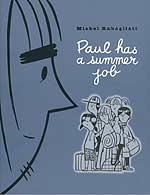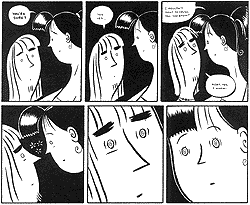
|
Taking place in Rabagliati's native Quebec during the heyday of Queen and Supertramp, "Summer Job" begins with Paul, the author's alter-ego, having just quit school and suffering the tedium of working at a printing press. Artistically inclined, he had acquired a government grant to paint murals on the school walls, but a ruthless principal pulled him off the job due to low marks. Bored, directionless and angry, the last stroke comes when Paul's pet bird dies. Luckily an acquaintance calls to offer Paul a job as a counselor at a woodsy camp for underprivileged children. He leaves the next day.
Completely avoiding such autobio pitfalls as pointless anectdotalism, self-indulgence and sentimentality, "Summer Job" has a classic coming-of-age storyline. Paul arrives at the camp as a self-pitying, privileged child of the middle classes. Afraid of the woods and uncomfortable around children Paul seems a terrible candidate for the job. His partner, Annie, quickly becomes infuriated with him, screaming, "The minute I saw you with the new overalls and $200 bootsI new what to expect: a daddy's boy!" The key turning point arrives during a long sequence of Paul learning to climb the rock face of an intimidating cliff. Wobbly and self-defeatist at first, he overcomes his nerves by telling himself he's getting closer to the top rather than further from the bottom.
 Paul and Annie get lost in each other's eyes
Paul and Annie get lost in each other's eyes |
As a bonus to Paul's increased maturity, Annie begins to take notice of him and the book soon becomes a charming first-summer-love story as well. Rabagliati does such a wonderful job of creating real characters that it is almost like we are falling in love as well. Well, we are, actually. Like any proper summer camp story, "Summer Job" has adventure as well. A canoe trip down some rapids soon turns dangerous when one of the boats cracks in half, trapping a camper under the swift current. Later, Paul and Annie find themselves in charge of Marie, a camper who is blind. Her irrepressible spirit becomes one of the book's emotional high points.
As it happened, the first issue of a new series about the lives of more contemporary young adults came across my desk at the same time as "Summer Job." It makes for a cruel comparison. (The author, who means well and is just starting out, shall be spared identification.) Full of shallow and spoiled characters who booze and screw, the Gen-Y book has as little point as they do. You feel kept at an arm's length either by its accuracy or its incompetence (depending on how cynical you are). Completely opposite to this, "Summer Job" pulls you in to sit around its campfire of humane values and sing songs with its delightful, full characters. Paul describes a "camp spirit" which also applies to the experience of reading the book: "There you are, in the middle of nowhere, with a group of people you like, and suddenly you lift off. Without noticing it, you're in a bubble. You become one with the word around you and everything else just fades away."
Growing up in Quebec (the book first appeared in French as "Paul a un travail d'été") Michel Rabagliati had more exposure to French comix than American ones. Consequently his style looks more like Tintin than the X-Men. Called "bandes dessinées," or the "clear line" style, he uses big, simple outlines with a minimum of chiaroscuro shading -- perfect for a bright, outdoorsy story. Rabagliati has a wonderful knack for caricature. Paul, for example, is distinguished mostly by thick brush strokes over each dot of an eye, and three vertical lines of "scruff" on his chin. "Clear Line" is nothing if not the most easy-to-read kind of cartooning in the world. Rabagliati lays out the pages with simple blocks that vary enough in size and shape to avoid eye fatigue. Copying his pages would be an instant university course in how to pace a comic book.
Both funny and touching, Michel Rabagliati's "Paul Has a Summer Job," has an authenticity sorely lacking in most forms of entertainment, not least of all comix. Exactly like a restorative trip to the woods, it reminds you of what you really enjoy literature for -- the chance to connect to others and what's real -- and get away from superficiality and irony. If only my summer camp had been like this
"Paul Has a Summer Job" can be found at superior comic shops as well as bookstores both real and virtual.
